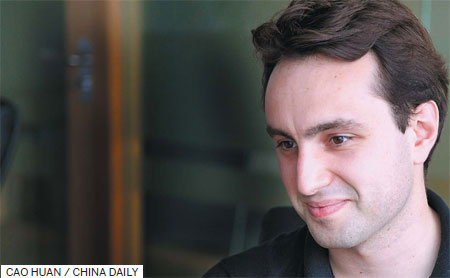The education of Andrea Pasinetti
Updated: 2013-07-02 06:19
By Liu Xiangrui (China Daily)
|
||||||||

|
Zheng Wei (left), a graduate from Wuhan University, communicates with her students at a middle school in Shantou, Guangdong province, which is included in the Teach For China program. Provided to China Daily |

He brings teachers to rural schools in China, giving the children a chance of a decent education. Funnily enough, he's a college dropout himself, but he tells Liu Xiangrui that has not stopped him from dreaming big.
Andrea Pasinetti does not make big money. In fact, he has not received a salary for the last five years and often pays the traveling expenses for the job from his own pocket. Pasinetti brushes away the curiosity and the questioning looks with confidence.
"I'm not a man of no desires. The fact is that I have gained a lot in terms of personal growth in the past five years," says the 27-year-old Italian-American, who believes he has found "the big thing" he wants to do in life.
Unlike famous college dropouts Bill Gates and Mark Zuckerberg, Pasinetti is not interested in building a fortune with his own business. He has a very different story to tell, starting from when he left Princeton University without completing his degree.
The next thing he did was to start working in the rural regions of China, carefully shunning the bright city lights.
Since 2008 he has endeavored to change the future of rural children with his Teach For China program, styled after the Teach For America program, which sends groups of graduates from top universities to classrooms in underprivileged areas.
At the organization's office in Beijing, Pasinetti, in jeans and a T-shirt, is caught up in multiple meetings - all part of his work. After six years in China, he now speaks fluent Chinese.
Teach For China now has 210 teachers helping more than 30,000 students. The number of teachers will increase to 340 in September, and TFC's ambitious goal is to send 1,000 teachers out to rural schools by 2015.
The organization has faced many challenges from the start. Pasinetti says its founding was quite accidental.
In 2005, a language program brought Pasinetti to China for the first time. He was then studying public and international affairs at Princeton. He returned to China in 2007.
"At the time I knew nothing about China's education or its rural environment. All I knew were about the big cities I visited," he says.
While he was doing research on rural policies for his thesis in 2007, Pasinetti got the chance to visit some rural communities. It was his first exposure and he still remembers how he was inspired by the words of a rural headmaster in Lincang prefecture, Yunnan province.
This was the catalyst that would later motivate him to start Teach For China.
He had arrived late at night at the secluded village perched on a mountaintop, after seven hours of traveling from the provincial capital in Kunming.
Pasinetti attended classes with the children in the school the next day and was bombarded with questions by curious students after class. The interaction left him the impression that the children were very smart.
He was shocked to learn later that few of the children he spoke with would get the chance to attend junior middle school, and almost none will make it to senior middle school. The headmaster said it was impossible for his school to keep teachers for long because the village was so remote, and conditions were very harsh.
"I remember his passion and eagerness to do everything possible to provide those children with a brighter future," Pasinetti says of the headmaster.
It was the same in other rural locations, and he heard the story repeated by local teachers and education bureau officials.
"They were really more eager for good teachers instead of more school buildings or multimedia classrooms," Pasinetti says.
Back in Beijing, he looked around for programs addressing this issue and found very few.
"I had the idea that perhaps I could do something to help alleviate the problem a little."
He called his college director and his parents in the United States and told them about his plan.
He never returned to Princeton University and is the only "high school graduate" in the program team.
Many people doubted his decision then, including Pei Yu, a classmate who has known Pasinetti since college.
According to Pei, Pasinetti seemed like a polite and well-groomed city boy who grew up in New York.
"It's hard for anyone to operate a nonprofit organization, let alone a foreigner. So I discouraged him then," Pei says. "He could have taken many other choices. I was surprised he decided to go into rural China."
Pei was later convinced by Pasinetti's passion and determination, and she later joined Teach For China. She has been there now for three years.
One of the changes she has observed in Pasinetti is physical. He now talks and acts like the locals when he visits rural schools, which was quite unimaginable when he first arrived in China.
Pasinetti says it's a conscious effort, and that he has tried to integrate into the community, including drinking for networking and working over meals.
While there are many challenges, he says the biggest one is to recruit really good teachers in a nonprofit organization and keep them in the rural communities. That takes the larger part of his energy and time.
"The nonprofit space in China is still very new. People tend to look for stable jobs and usually don't perceive a job with a nonprofit organization as a lifelong career," he explains.
"We all came into this work with a great sense of idealism. That's why we can stick to the program for so many years."
Yang Xiao, a former graduate student from Tsinghua University, applied for the program after he saw a poster on campus and started to teach at a rural middle school in Yunnan on a two-year contract.
The 26-year-old believes the teaching experience is valuable, and has stayed and became a recruitment officer.
"I believe it's a meaningful work, and I agree with the mechanism of Teach For China," Yang says.
Pasinetti says, "We have an ambitious plan for the future, and I hope to be part of that and help the organization achieve its goals."
Contact the writer at liuxiangrui@chinadaily.com.cn.
(China Daily USA 07/02/2013 page8)

 Egypt army gives Mursi 48 hours to share power
Egypt army gives Mursi 48 hours to share power
 No quick end in sight for Beijing smog
No quick end in sight for Beijing smog
 New filial law sparks debate
New filial law sparks debate
 Bakelants claims Tour de France second stage
Bakelants claims Tour de France second stage
 2013 BET Awards in Los Angeles
2013 BET Awards in Los Angeles
 Gay pride parade around the world
Gay pride parade around the world
 Four dead in Egypt clashes, scores wounded
Four dead in Egypt clashes, scores wounded
 New NSA spying allegations rile European allies
New NSA spying allegations rile European allies
Most Viewed
Editor's Picks

|

|

|

|

|

|
Today's Top News
Kerry hails China's denuclearization bid
19 firefighters killed in Arizona fire
Book reveals islands' true history
Tokyo warned not to resort to 'empty talk'
Snowden applies for Russian asylum
No quick end in sight for Beijing smog
New home prices defy curbs
Mandela 'still critical but stable'
US Weekly

|

|







